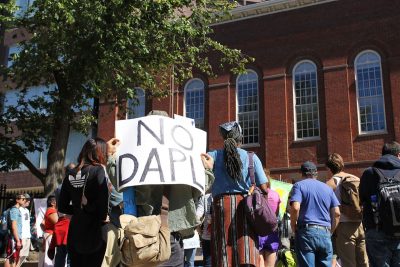
Two local activists took action to encourage TD Bank to divest from the Dakota Access Pipeline by blocking the entrance to the bank’s Downtown Crossing branch on Friday morning, according to a press release from activism leaders.
Kristina Jacobs, of Woburn, and Jonathan Barry, of Brighton, used PVC pipes to lock their arms together, and Jacobs used bicycle locks to secure her neck to a door handle at the main entrance of the bank, according to the release.
Jacobs’ method is popular among activists and is considered safe if executed correctly, according to Mark Schwaller, a Boston activist who has led several local actions protesting the pipeline and sent the release.
“As long as the firefighters and police are safe when they’re removing her, then it’s a very safe tactic,” he said.
Jacobs and Barry planned to remain at the bank for as long as possible, but they were removed safely and arrested after about an hour, according to Schwaller.
TD Bank is a major financial supporter of the pipeline, which is currently under construction on Lakota Treaty Territory at the Standing Rock Sioux Reservation, according to the release.
“TD Bank can still do the right thing and cut its line of credit for the Dakota Access Pipeline,” Barry said in the release. “We will keep coming back until they divest from this project.”
Several people distributed flyers around the bank urging people to close their accounts, according to the release. Banners and signs with slogans such as #NoBlackSnakeFriday were also displayed at the demonstration.
Karan Doczi, a Boston activist who works with the Oceti Sakowin Tradition Council, explained that #NoBlackSnakeFriday is in reference to the Black Snake, which is what the native people at Standing Rock call the pipeline.
The slogan combines that name with Black Friday in order to make a statement about the negative effects of consumerism in light of Thanksgiving, Black Friday and Cyber Monday, according to Doczi.
“Those three cultural institutions truly perpetuate the injustices and the atrocities that have been committed against the native people of Turtle Island,” she said. “We wanted to raise awareness by bringing the Black Snake and Black Friday together.”
In addition to protesting banks that fund the pipeline both directly and indirectly, Doczi highlighted several other actions allies can take to support the indigenous people of Standing Rock, including joining the Medicine Wheel Solidarity Network.
“The solidarity network is our attempt to connect non-native allies with the native community,” she said.
The Medicine Wheel Solidarity Network is made up of “working groups,” according to Doczi, and includes groups of people who offer legal support, healers and those who choose to show their support by traveling to North Dakota.
Doczi said that while making the trip to North Dakota is an important way to protest the pipeline, allies must be self-sufficient and educated in order to truly support the cause.
“It’s important that people are not only well prepared physically … so they do not make a demand on the camp, but that they also get some background and education before they go out there,” she said. “We’re trying to provide that through the solidarity network.”
Several Boston residents said they support the actions being taken in Boston to protest the pipeline.
Siedric White, 37, of Dorchester, said big corporations should respect the rights of indigenous people.
“They’re … not taking into account what the public’s wants and needs are, especially the Native American population,” White said. “It seems like the police, or the authorities who are there, are the ones that may be exacerbating the issues.”
Phil Hu, 26, of Fenway, said activists should continue to protest peacefully.
“It’s a shame that there’s so much violence going on from the government in trying to suppress the protests,” Hu said. “I don’t know the legal ground of the protests, but if they’re peaceful and lawful, I think it’s a right for people to protest.”
Jennifer Montenegro, 17, of Brighton, said the protests in North Dakota haven’t been getting enough attention in the media.
“Not many people stand up for what they believe in and [the pipeline] is harming such a large community that many people don’t focus on,” Montenegro said. “Native Americans have been treated very poorly over the past few years and they’re never brought into attention of how their land is being mistreated.”
























































































































Beau Rivers • Dec 1, 2016 at 11:12 pm
I hope TD can find it in their heart to lower the interest rates on loans for the pipeline.